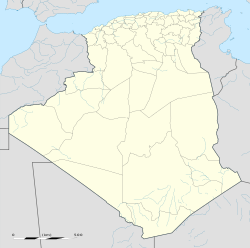Bab El Oued باب الواد | |
|---|---|
 Bab El Oued | |
 Location of Bab El Oued in the Algiers Province | |
Location of Bab El Oued in the Algeria | |
| Coordinates: 36°47′26.53″N3°2′59.03″E / 36.7907028°N 3.0497306°E | |
| Country | |
| Province | Algiers Province |
| District | Bab El Oued District |
| APC | 2012-2017 |
| Government | |
| • Type | Municipality |
| • Mayor | Athmane Sahbane |
| Area | |
• Total | 43 sq mi (111 km2) |
| Population | |
• Total | 214,900 |
| • Density | 149,000/sq mi (57,700/km2) |
| Time zone | UTC+1 (CET) |
| Postal code | 16007 |
| ISO 3166 code | CP |
Bab El Oued is a neighbourhood in Algiers, the capital of Algeria, along the coast north of the city centre. As of 2008, the population of the commune of Bab El Oued was 64,732. [1]



